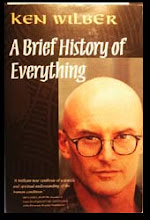A day of exploring "the Union of Theory and Practice" with leaders from Integral and EnlightenNext generated a surprising level of enthusiasm for cooperation between the two movements. This surprised me because I thought the day was to be about unifying theory and practice in our own lives. And thus, I expected a discussion of
transformational practice groups. But the two levels of focus came together beautifully for me at the end when I was able to propose a practice group exchange as one of the ways the organizations could explore closer cooperation.
Second Generation Facilitators
Jeff Carreira left, Clint Fuhs, right
Our facilitators for the session July 15/16 were top students of the leaders of the two movements:
Clint Fuhs from Ken Wilber's Integral and
Jeff Carreira from Andrew Cohen's EnlightenNext (formerly What is Enlightenment). And thus, they referred to themselves--and us--as the "second generation" in these movements. (They actually used the term "lineages" instead of movements, and I can say that with a straight face if it is understood as Integral being in the lineage of Neo-Platonism and EnlightenNext in the lineage of some aspects of Eastern philosophy--with, of course, Andrew Cohen's radical twist that evolution is unending, rather than cyclical as Wilber and many of the Eastern traditions maintain.)
Jeff is the Director of Education for
EnlightenNext, and Clint is the Director of
Core Integral which offers college level courses on Integral theory. Both men
love ideas, and I could have sat all day for their rapid fire exchange. And yet, both men also exude that quality of presence that makes me feel they walk their talk. Clint made us laugh playing gunslinger, whipping concepts out of both holsters. "Integral is not a path, it's a map," he said. I laughed especially loud when one fan of Rumi asked, "How do you relate to the heart?" and Clint said, "We map it."
Which Comes First?
Clint told us that practice precedes theory: while most people think Ken Wilber took up meditation, for example, because of his theory, it was actually his experiences of practice that led to Integral Theory, he said. My favorite point from Jeff may have expressed the opposite truth. He said he stopped being a seeker when he realized that enlightenment as a state experience might never happen to him; he couldn't wait for it. "Forget enlightenment. I want freedom now!" he had proclaimed.
The facilitators set us to work early. In small groups we completed the sentence stems:
- What I bring to this discussion is....
- The gifts of Integral/EnlightenNext are...
- The shadows of Integral/EnlightenNext are..
- How the two lineages could support each other is...
Authenticity: What's their Secret?
In my small group, I was impressed with the ease with which the ENext folks spoke from an authentic, intentional place, apparently setting ego aside. I have actually noticed this quality in many of the ENext people I have met, going back to the day I met
Steve Haase when he and I were the only two to show up at the first meeting of the DC Wilber Meetup. How did these folks maintain that quality over time? What practices are they following? I determined to find out.
Gifts and Shadows
The results from our groups looked something like this--with my editorial additions and rearrangements:
This exercise covered a lot of ground quickly and diffused tensions in the room. A rich camaraderie began to develop between the two groups. Jeff pronounced that the results were "no surprise," and challenged us to consider, therefore, that the problems we listed were not really shadow because they were obvious to everyone. The shadow, he said, is the fear or grasping that prevents us from addressing the problems we all acknowledge. I was still pondering that when my Integral buddy Anita voiced my next thought, "This looks like a polarity map: not problems to be solved, but
polarities to manage." ENext folks started saying, "I'd like to learn more about Integral Theory--and lining up to buy Clint's course.
Followup
Our final practice of the day was a circled up conversation of "Whatever wants to be spoken into the room," facilitated by Jeff. Several of the ENext people expressed an intense desire for closer cooperation between the two groups. Clint warned that that kind of enthusiasm can be difficult to maintain; was anyone willing to make specific commitments for followup?
The idea for the day was birthed by local coordinators for the two groups: Malcolm Pettus from the
DC Ken Wilber Meetup and Ryan Diener from the
DC EnlightenNext. Malcolm committed to make Ryan an assistant coordinator on the Meetup site, which would give Ryan direct access to posting events. Several of the ENext folks offered to establish joint mailing lists. Clint and Jeff said they would be open to returning in six months for a follow up session.
Practice Group Exchange
I offered to coordinate a practice exchange. I explained that members of the Wilber Meetup have been experimenting with various formats for practice groups; it could be useful and enlightening to learn what ENext does before we shape our next round. I am thinking something like a few of us visit one of their sessions and then invite them to attend one of ours--something like that.
Most folks went to dinner together afterwards, and the ENext folks invited us to a picnic the next day. All in all, a fine start to a courtship.
![]() |
Event organizers: Malcom Pettus first row, second from left (between Clint and me) and Ryan Diener third row far right.
Chief chauffeur and love muffin Anita maintains her usual low profile third row far left. |
|
Comments heartily encouraged.









